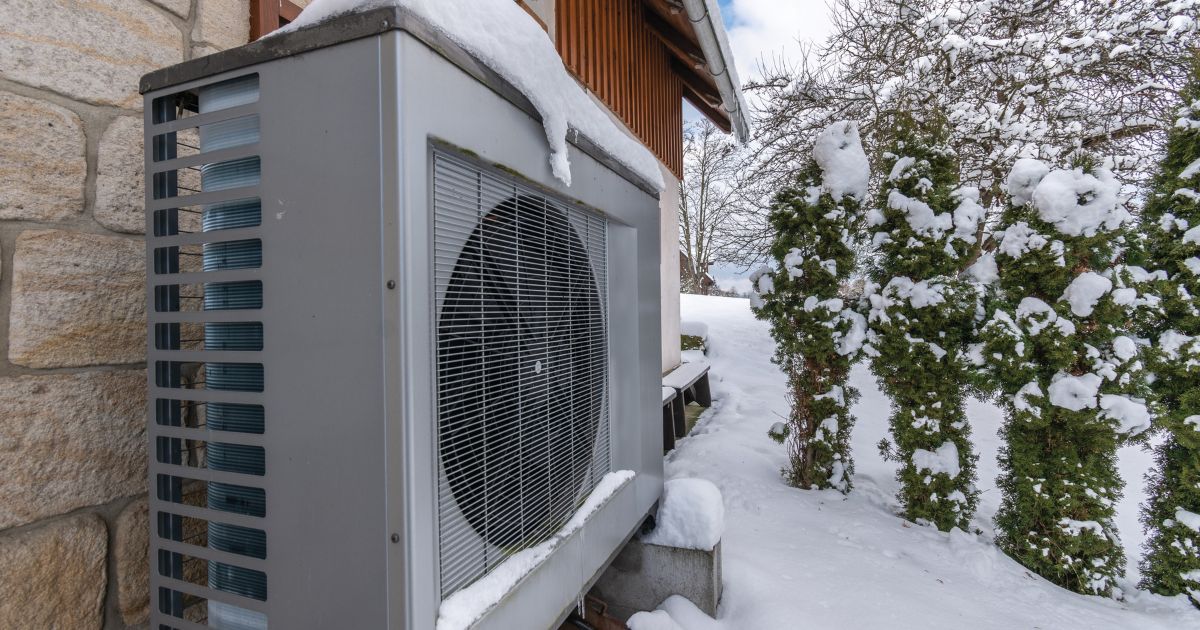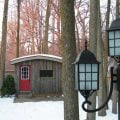Should your next furnace be a heat pump? Or, more precisely, should your next furnace and air conditioning unit be a heat pump? FYI, it can warm and cool your home, making it usable all year long.
It’s only in the last few years that consumers have begun to familiarize themselves with heat pumps as an option for their homes, despite the fact this technology has been around since 1856. And myths surrounding heat pumps remain, including the belief that they don’t work in cold weather. In one recent survey, 35% of respondents believed that “heat pumps will leave you frozen out when you need (heating) the most.”
However, the reality is very different. Heat pumps are 300% more efficient than baseboard heaters and furnaces, and 50% more efficient than AC units. And, unlike most furnaces, they run on electricity, not gas (unless it’s a hybrid heat pump). Speaking of gas, a recent study found that heat pumps are more efficient than gas heating, even in cold weather. And here’s another consideration that could convince you to transition to a heat pump sooner rather than later: some parts of Canada have banned fossil-fuel heating systems in new homes.
Despite the growing body of good news surrounding heat pumps as a product category “set to explode,” Canadians have still been slow to embrace them as an HVAC (heating, venting and air conditioning) solution, compared to the rest of the world. In 2023, only 7% of Canadian homes had used heat pumps in the past 12 months. That’s far lower than in Europe. In Norway, 60% of homes use heat pumps, followed by Sweden at 43% and Finland at 41%. In 2022, heat pump sales in Europe grew nearly 40% year-over-year (including both air-heating and water-heating heat pumps), compared to 11% for the rest
of the world, according to the International Energy Agency.
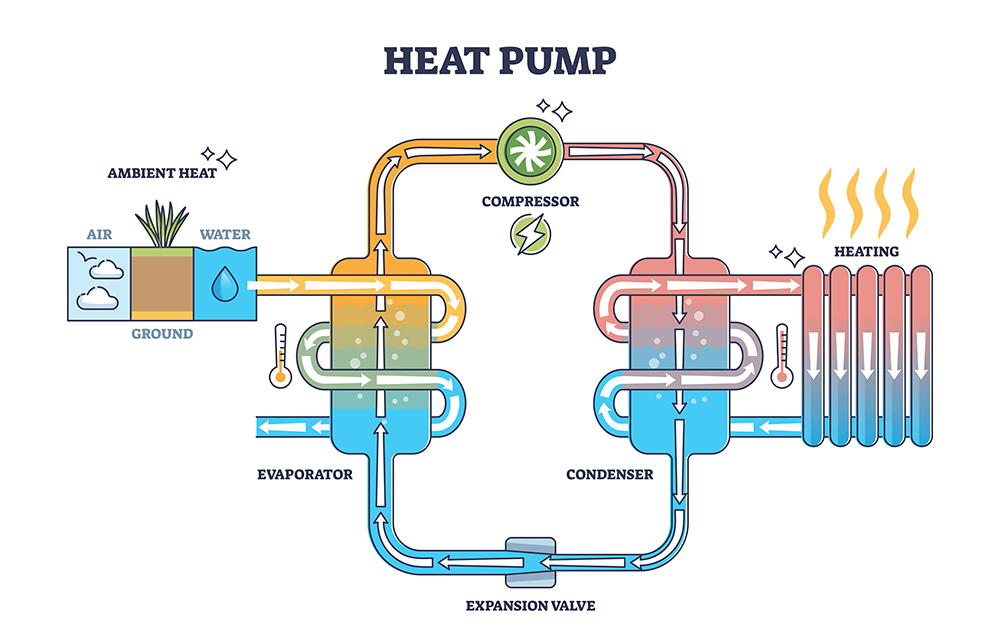
So, why aren’t Canadians jumping on board, recognizing the potential energy savings of heat pump solutions? “When discussing the differences between Canada and Europe, one of the main drivers that impacts the uptake of home heating electrification is energy prices,” says Robin Librach, the communications officer for Natural Resources Canada (NRCan).
The cost of gas, electricity and natural gas have skyrocketed in many parts of Europe since Russia invaded Ukraine, so European consumers are understandably searching for more cost-efficient ways to heat and cool their homes.
As heat pump demand heats up, government support cools Few Canadian households have a heat pump, but NRCan numbers suggest that the tide may finally be turning. Since the federal government launched the Canada Greener Homes initiative in May 2021, more than 47,000 home owners have received grants for heat pumps. And heat pumps are the most frequent retrofit undertaken by those participating in the program, followed by windows and doors, home insulation, air sealing and solar panels.
Overall, the good news is that one-third of Canadians home owners say they are willing to transition to heat pumps. Unfortunately, the Canada Greener Homes Grant—which previously provided financial incentives from $2,500 to $5,000 for
home owners switching over to a heat pump—is now closed to new applicants.
The explanation given by the federal government is that the $2.6-billion program was so popular that the funds ran out, leading it to pull the plug early. The initiative was originally slated to run through to March 2027. If you’re a home owner who managed to get in under the wire, and your pre-retrofit evaluation by a certified technician recommends installing a heat pump, you can still apply for the grant, provided you have at least one cost estimate.
New for 2024: The Oil to Heat Pump Affordability Program Launched by the federal government in March of this year, the Oil to Heat Pump Affordability Program (OHPA) presents another opportunity to get funding for a heat pump, with grants of up to $10,000. The program will run for the next four years, with a budget of $750 million.
To qualify, your home must currently be heated by oil, and your after-tax household income must be equal to or less than the amounts listed on NRCan’s websites, which also vary from province to province. And you must have purchased at least 1,000 litres of heating oil in the last 12 months. The provinces of Alberta, B.C., Manitoba, New Brunswick, Ontario, Quebec and Saskatchewan, as well as the Northwest Territories and Yukon territory, are all participating in this program. You can check your eligibility for the OHPA online.
There is also an enhanced co-delivery program whereby the provinces of Newfoundland and Labrador, Nova Scotia and Prince Edward Island are partnering with the federal government to offer grants of up to $15,000.
How much does a heat pump cost in Canada?
FurnacePrices.ca cites quite a broad range of heat pump prices in Canada, from $6,000 to $25,000 “with a simple ductless mini-split air conditioner system sitting at the lower end of the price range while a geothermal or ground-source heat pump comes with a remarkably higher price.” (See below for more on different heat pumps). Factors such as the size/type of home, type of system, local installation charges and the brand of product all factor into the final heat pump cost.
Despite the demise of the Canada Greener Homes Grant, NRCan’s website still provides valuable insight into heat pumps for Canadian consumers. This includes a comprehensive overview of heat pumps that explains the two main types of residential products: air source and ground source. Air-source heat pumps pull heat from the outside air during colder months and do the reverse, removing warm air from inside the house, during the hotter months. The main difference with ground-source heat pumps is the actual source. The earth, ground water or both heat your home in the winter and cool it in the summer.
Another key differentiator: how the air is exchanged. A central ducted heat pump solution works in tandem with the existing ductwork of your home. For homes without ductwork, owners can opt for mini split-system heat pumps, which consist of an outdoor compressor/ condenser and one or more indoor handling units that are mounted on the wall—much like a room air conditioning unit.
Heat pumps can also work in condos or apartments, provided you have a standalone HVAC system. But if you’re part of a whole-building system, then the decision to adopt this technology will come down to what your condo corporation or building manager decides to do. But it’s certainly possible to install a heat pump in a larger building.
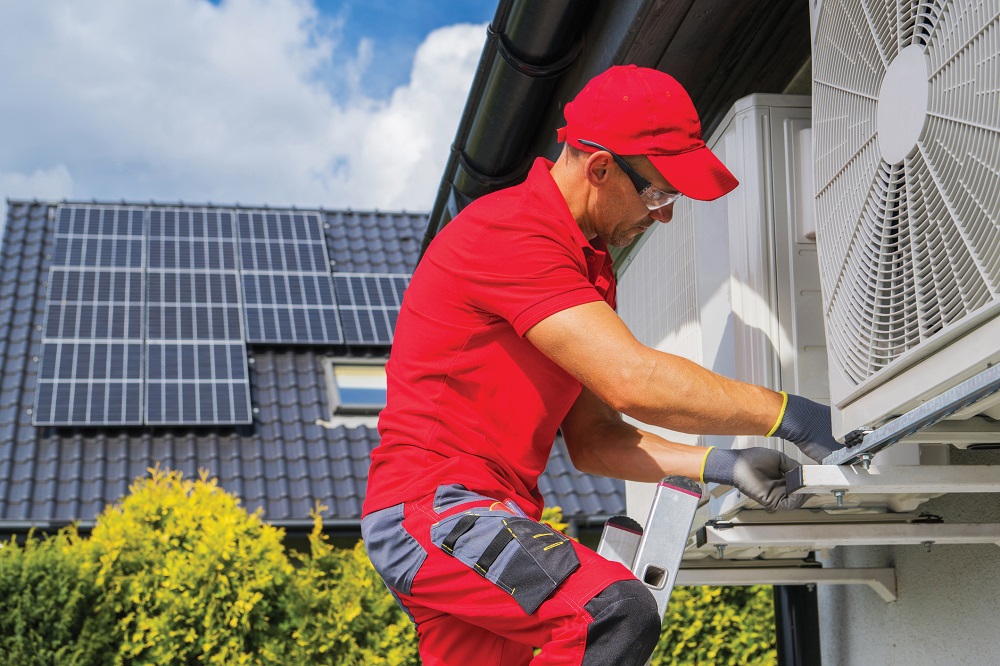
Heating and cooling by the numbers
Reflecting Canada’s cooler climate for much of the year, the vast majority of heat pumps (about 75%) purchased to date through the Canada Greener Homes Grant have been cold-climate air-source heat pumps (ccASHPs). These units operate well below freezing, with current models from companies such as Senville and Mitsubishi producing heat from air as cold as -30°C.
NRCan recommends choosing an Energy Star–certified heat pump, which is 5% more efficient than one that’s not certified. The Canada Greener Homes Grant requires that heat pumps be capable of producing 12,000 BTUs per hour when outside temperatures are as low as 8.3°C, and from a cooling standpoint, the unit must meet a Seasonal Energy Efficiency Rating (SEER) equal to or greater than 15.2. (SEER ratings range from 13 to 30.) These are still good specs to look for, grant or no grant. To help you grasp what SEER means, here’s how the Mitsubishi Electric site describes it: “SEER is the miles per gallon of HVAC and represents how much electricity is required to run a unit at full capacity during a given period of time.” (Instead of miles per gallon, think kilometres per litre, here in Canada). So, the higher the SEER, the less electricity required to run the unit. And typically, the higher the SEER, the more expensive the heat pump.
Is a heat pump right for your home?
Whether or not you should install a heat pump depend on a lot of variables, including how big your energy bills are, the size and energy efficiency of your home and, at least for some, whether or not you want to lower your personal carbon footprint.
Canadians also need to overcome the notion that heat pumps won’t work during winter months. As observed by NRCan’s Librach, “Contrary to common misconceptions, electric heat pumps are a proven technology in cold climates.”
Yet another perceived barrier is cost. But Librach helps to put this into perspective: “Heat pumps can cost more up front than conventional heating systems, but their higher efficiency can pay off in the long run, especially when considering available incentives.” And if you are a home owner who still qualifies for the Greener Homes Grant, Librach says the value of the grant
could represent 15% to 25% of the installation cost.
Then again, the overall efficiency of a heat pump—or any heating or cooling system—also depends on how well insulated and sealed the home is. Librach recommends that home owners take an “envelope-first approach” that helps to minimize heat (and cooling) loss and lowers the heat (and cooling) load of a home.
If your home is already well insulated and you need to replace your existing furnace or AC unit, installing a heat pump could prove to be your best option.
Consider getting one—heat pumps are here to stay, and you’ll enjoy having a cleaner, more energy-efficient way to heat and cool your home.
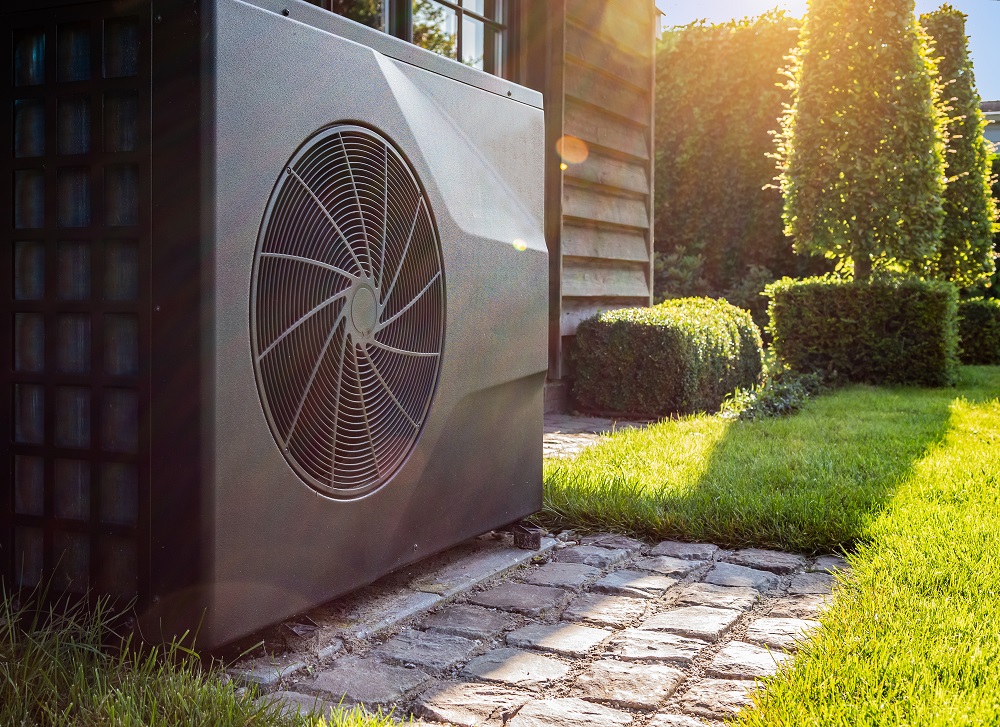
Heat pumps of the future
Whether you decide to purchase a heat pump or hold off for now, one thing for certain is that this 19th-century invention continues to evolve and improve for the benefit of consumers, taking advantage of 21st-century technology every step of the way.
A prime example: As already touched on above, the proverbial heat pump bar keeps being lowered—as in the ability of heat pumps to operate more effectively in cold weather, thanks to the introduction of cold-climate inverter compressors, which run at variable speeds, requiring less energy. Even if you do happen to live in a part of the country where temps go down to -30°C,
hybrid heat pumps that integrate with your existing gas furnace will help to ensure you stay warm.
And just as heat pumps are increasingly deemed to be a smart choice for consumers, the heat pumps of the future promise to be even smarter. Scientists are already working on AI (artificial intelligence) heat pumps that will “learn” from how your heat pump’s usage and performance to improve the energy efficiency and comfort of your home.
This article originally appeared on MoneySense.ca and has been published here with permission.
Mark Douglas Wessel is an urban journalist and communications consultant whose writing focuses on what we can do to create a more sustainable, more liveable world. To get the best Canadian financial information for your home and other personal finance tips, sign up for MoneySense’s free newsletters at moneysense.ca/newsletter.

